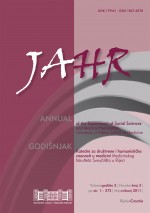Child abuse in top sport – ethical challenges
Keywords:
child, sport, abuse, ethical challengeAbstract
Doing sport usually represents a positive experience. Unfortunately, we have started facing more and more examples of abuse and violence against children in relation to sport. Th e instances of child abuse is not only diffi cult defi ne – it is a complicated ethical issue which require professional approach by a pedagogue, a kinesiologist, a psychologist, a physician and a sociologist. Generally, there are no data which would show the frequency and prevalence of abuse in sport, particularly in Croatia. Athlete's development is primarily aff ected by his or her sports talent and training process, but also by several external factors, predominantly: sports club, coach, co-players, family, school and social community. Th ey can be at the same time the sources of diff erent types of child abuse in sport and the relation of professionals and the society in general towards them is a serious ethical challenge.A period in which young athletes are the most vulnerable and most exposed to abuse is a pe-riod in which they have the most to lose, the period of achieving high levels of sports results. Abuse and violence by coaches become acceptable and are generally tolerated if at the same time the athlete achieves noticeable results and is successful. Th at paradox presents the most serious ethical challenge in coaching children in top sport. Is it acceptable to move the limits of what is considered to be abuse and accept that abuse with the purpose of achieving top sports results?
Downloads
Published
Issue
Section
License
Authors who publish with this journal agree to the following terms:
- Authors retain copyright and grant the journal right of first publication with the work simultaneously licensed under a Creative Commons Attribution License that allows others to share the work with an acknowledgement of the work's authorship and initial publication in this journal.
- Authors are able to enter into separate, additional contractual arrangements for the non-exclusive distribution of the journal's published version of the work (e.g., post it to an institutional repository or publish it in a book), with an acknowledgement of its initial publication in this journal.
- Authors are permitted and encouraged to post their work online (e.g., in institutional repositories or on their website) prior to and during the submission process, as it can lead to productive exchanges, as well as earlier and greater citation of published work (See The Effect of Open Access).



